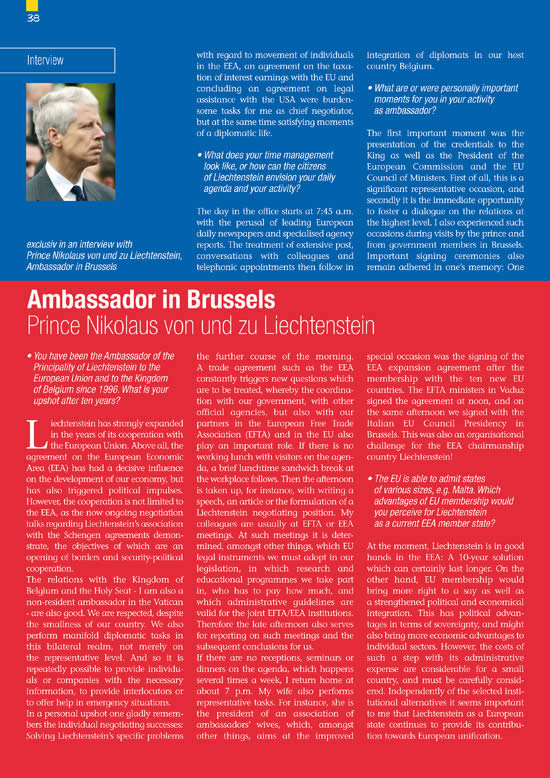 Ambassador in Brussels
Prince Nikolaus von und zu Liechtenstein
Ambassador in Brussels
Prince Nikolaus von und zu Liechtenstein
exclusiv in an interview with
Prince Nikolaus von und zu Liechtenstein,
Ambassador in Brussels
• You have been the Ambassador of the
Principality of Liechtenstein to the
European Union and to the Kingdom
of Belgium since 1996. What is your
upshot after ten years?
Liechtenstein has strongly expanded in the years of its cooperation
with the European Union. Above all, the agreement on the European
Economic Area (EEA) has had a decisive influence on the development of
our economy, but has also triggered political impulses. However, the
cooperation is not limited to the EEA, as the now ongoing negotiation
talks regarding Liechtenstein’s association with the Schengen
agreements demonstrate, the objectives of which are
an opening of borders and security-political
cooperation.
The relations with the Kingdom of Belgium and the Holy Seat - I am also
a non-resident ambassador in the Vatican - are also good. We are
respected, despite the smallness of our country. We also perform
manifold diplomatic tasks in this bilateral realm, not merely
on the representative level.
And so it is repeatedly possible to provide individuals or companies
with the necessary information, to provide interlocutors or to offer
help in emergency situations.
In a personal upshot one gladly remembers the individual negotiating
successes: Solving Liechtenstein’s specific problems with regard to
movement of individuals in the EEA, an agreement on the taxa-tion of
interest earnings with the EU and concluding an agreement on legal
assistance with the USA were burdensome tasks for me as chief
negotiator, but at the same time
satisfying moments of a diplomatic life.
• What does your time management
look like, or how can the citizens
of Liechtenstein envision your daily
agenda and your activity?
The day in the office starts at 7:45 a.m. with the perusal of leading
European daily newspapers and specialised agency reports. The treatment
of extensive post, conversations with colleagues and telephonic
appointments then follow in the further course of the
morning.
A trade agreement such as the EEA constantly triggers new questions
which are to be treated, whereby the coordination with our government,
with other official agencies, but also with our
partners in the European Free Trade Association (EFTA) and in the EU
also play an important role. If there is no working lunch with visitors
on the agenda, a brief lunchtime sandwich break at the workplace
follows. Then the afternoon is taken up, for instance, with writing a
speech, an article or the formulation of a Liechtenstein negotiating
position. My colleagues are usually at EFTA or EEA meetings. At such
meetings it is deter-mined, amongst other things, which EU legal
instruments we must adopt in our legislation,
in which research and educational
programmes we take part in, who has to pay how much, and which
administrative guidelines are valid for the joint EFTA/EEA
institutions. Therefore the late afternoon also serves for reporting on
such meetings and the subsequent conclusions for us.
If there are no receptions, seminars or dinners on the agenda, which
happens several times a week, I return home at about 7 p.m. My wife
also performs representative tasks. For instance, she is the president
of an association of ambassadors’ wives, which, amongst other
things, aims at the improved integration of diplomats in our host
country Belgium.
• What are or were personally important
moments for you in your activity
as ambassador?
The first important moment was the presentation of the
credentials to the King as well as the President of the European
Commission and the EU Council of Ministers. First of all, this is a
significant representative occasion, and secondly it is the immediate
opportunity to foster a dialogue on the relations at the highest level.
I also experienced such occasions during visits by the prince and from
government members in Brussels. Important signing ceremonies also
remain adhered in one’s memory: One special occasion was the signing of
the EEA expansion agreement after the membership with the ten new EU
countries. The EFTA ministers in Vaduz signed the agreement at noon,
and on the same afternoon we signed with the Italian EU Council
Presidency in Brussels. This was also an organisational challenge for
the EEA chairmanship country Liechtenstein!
• The EU is able to admit states
of various sizes, e.g. Malta. Which
advantages of EU membership would
you perceive for Liechtenstein
as a current EEA member state?
At the moment, Liechtenstein is in good hands in the EEA: A 10-year
solution which can certainly last longer. On the other hand, EU
membership would bring more right to a say as well as a strengthened
political and economical integration. This has political advan-tages in
terms of sovereignty, and might also bring more economic advantages to
individual sectors. However, the costs of such a step with its
administrative expense are considerable for a small country, and must
be carefully consid-ered. Independently of the selected institutional
alternatives it seems important to me that Liechtenstein as a European
state continues to provide its contribu-tion towards European
unification.